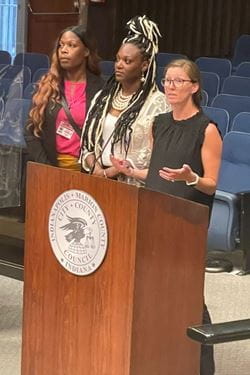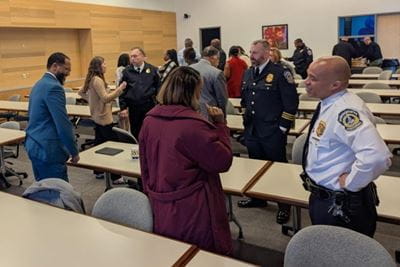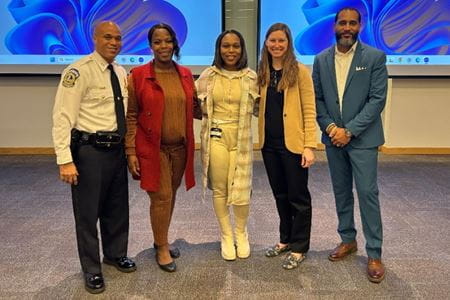Firearm injuries are the leading cause of death among children and teens in Indiana and the United States. While thousands lose their lives to gun violence each year, thousands of other victims survive and are left to navigate the physical and psychological toll of their injuries.
In response to Indianapolis’ ongoing gun violence challenges throughout the last few years — more than 500 non-fatal shootings in 2024 alone — Lauren Magee, PhD, a public health and criminal justice expert, partnered with the Indianapolis Metropolitan Police Department (IMPD) and local advocates to create the Non-Fatal Shooting and Advocacy Support Program. This initiative provides outreach and resources to victims and families affected by non-fatal firearm injuries in Indianapolis.
“More than one person a day is shot and survives in Indianapolis,” said Magee, an assistant professor of pediatrics at the Indiana University School of Medicine Division of Children's Health Services Research, part of the Department of Pediatrics. “Investing in understanding how we can prevent firearm injuries from killing kids more than cancer or car accidents, while also addressing the trauma that comes from gun violence, is critical to improving the well-being of our city and state.”
Magee’s research and expertise have been instrumental in the success of the Non-Fatal Shooting and Advocacy Support Program, not only improving assistance for gun violence victims in Indianapolis but also generating data that contributes to safer community outcomes.
Taking an informed approach
Magee’s relationship with the IMPD began a decade ago when she worked as a crime analyst, and her connection with the department deepened as she transitioned into a career focused on firearm violence research.
“My research examines health outcomes of people who have been impacted and exposed to gun violence, specifically non-fatal shooting survivors, by focusing on their post-injury needs and how to better connect them with care,” Magee explained.
Around 2020, the IMPD began exploring the idea of a non-fatal shooting support program. With government funding, they were able to bring Magee into the mix as a research partner. She worked closely with IMPD Deputy Chief Kendale Adams and the program’s first supervisor, DeAndra Dycus, to officially launch the Non-Fatal Shooting and Advocacy Support Program in 2022.
Dycus became a gun violence awareness advocate after her teenage son was shot and critically wounded in 2014. She has connected with several parents who, like her, had children injured in incidents as innocent bystanders.
“A lot of non-fatal gun violence victims feel judged and don’t want to share their stories because there's a stigma with surviving a gunshot wound, and we need to remove that stigma,” Dycus expressed. “There’s a cost to surviving — mentally, physically, financially and emotionally. Addressing those costs is where healing begins. That’s why I really appreciate Lauren for bringing awareness and attention to non-fatal shootings when it felt like no one else was talking about it.”
A key aspect of the program is connecting shooting survivors and their families with community advocates who have personal experience with gun violence. These advocates provide immediate outreach and ongoing support, creating a compassionate and understanding network for survivors. They also direct survivors to essential social and behavioral health resources, including mental health services, housing options, employment assistance, legal guidance, food support and more.
“The program offers a better way for advocates to connect with survivors and families because they’ve walked similar paths and can be viewed as credible messengers,” Magee said.

Turning research into action
The Non-Fatal Shooting and Advocacy Support Program concluded its three-year pilot study in 2024, with Magee’s data revealing that the city and the program’s advocates successfully connected with more than 500 survivors of gun violence.
“Many survivors expressed they were happy somebody called them just to see how they were doing,” Magee said. “They just wanted to talk to the advocates on a semi-routine basis about their experience.”
The data also revealed that program participants were more likely to engage with detectives investigating their cases. This valuable outcome supports the program’s law enforcement goals of reducing future firearm injuries and increasing case clearance rates, which refer to the number of shooting crimes that are successfully investigated and solved.
“Nationally, the clearance rate is anywhere from 18% to 20%, and ours is right around 30%,” Deputy Chief Adams said. “It’s still not good enough, but it’s certainly much better than the national average.”
Preliminary findings indicated the program contributed to a slight reduction in reinjury rates, suggesting that victims who participated were less likely to be involved in another shooting incident.
To raise awareness for the program’s continued success, Magee recently presented her pilot study findings to prominent Indianapolis community members, including police officers, representatives from the mayor’s office and other local leaders.
“I really give credit to the chiefs of IMPD for their willingness to try this program and to address the continuous epidemic of gun violence in Indianapolis,” Magee said. “There’s value in having data behind the program to understand what’s working or not working.”
Breaking barriers and building relationships
While data confirming the program’s success is essential to its longevity, the human stories behind the numbers are just as meaningful. Advocates have helped survivors access counseling services and provided support in unexpected ways, such as replacing household items damaged during shootings or covering utility and medical bills.
Magee recalled an instance in which advocates helped set up accessibility accommodations at home and school for a young survivor who became paralyzed after a shooting.
“They also made sure he was receiving the emotional services he needed because he was mentally struggling with the sadness of the shooting and being paralyzed,” she revealed. “He has a much more positive outlook on life now because of the assistance the advocates were able to give him.”
The program’s organizers have countless inspiring examples of people of all ages whose lives have been positively impacted by the program. Many of these stories highlight the often-overlooked challenges faced by non-fatal shooting victims and their families.
“These families have to go through journeys that are not only expensive but also very daunting,” Adams said. “Understanding the impact of non-fatal shootings and talking about that with survivors has made us a more informed community and I think Dr. Magee has helped inform our agency about the current trends.”
Magee and Adams agreed that the program has done an incredible job connecting the community with law enforcement. Some advocates even visit middle and high schools to talk with students about the impacts of gun violence. Still, they believe more work is needed to ensure the program continues to grow, reaches more people and has the resources to meet the city’s needs.
“There is a need and desire from the police department to further push this out in the community to let more people know that this program is happening and to be more transparent with the data and what's happening behind the scenes,” Magee said.
With pilot funding concluding in 2024, the program has secured additional support to continue for at least three more years. During this time, it will expand its collaboration with hospital-based violence intervention programs and deepen partnerships with other community organizations. Magee hopes the program will eventually become a permanent, core function of the police department.

Inspiring change
While other police departments in the country have units focused on non-fatal shooting investigations, Magee expects Indianapolis’ data-driven and collaboration-centered approach will inspire more cities to treat non-fatal gun violence with the same urgency and dedication as fatal incidents. She said working on the program with the IMPD and community advocates has been a personal highlight in her professional career over the last several years. Their innovative model even earned Magee the Multidisciplinary Science Award at the 2023 National Firearm Conference.
“The collaboration and friendships that have formed with the survivors and community partners keep me going on those hard days,” she admitted.
The community and police department have also greatly benefited from Magee’s dedication, research and affability. She participates in several community advocacy events and meetings, including a National Gun Violence Awareness Day gathering on June 6 at the Nexus Impact Center in Indianapolis to bring together and empower women affected by gun violence.
“She's helped our community refocus on non-fatal shootings because the reality is those people are living and we have an opportunity to break the cycle of violence,” Adams said.
Above all, the program provides a valuable reminder that gun violence is more than a statistic — it’s a public health crisis with lasting effects that ripple through communities long after a shooting occurs.
“These issues can’t just be a health answer, or a community answer or a police department answer,” Magee expressed. “There’s a multiagency focus that’s needed to address gun violence in our communities and our country.”
